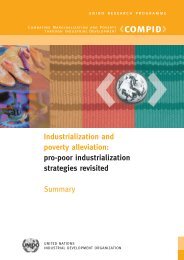Manual on the Development of Cleaner Production Policies ... - Unido
Manual on the Development of Cleaner Production Policies ... - Unido
Manual on the Development of Cleaner Production Policies ... - Unido
You also want an ePaper? Increase the reach of your titles
YUMPU automatically turns print PDFs into web optimized ePapers that Google loves.
DEVELOPMENT OF CP POLICY<br />
MODULE 4: POLICY TOOLS AND INSTRUMENTS<br />
EXAMPLE<br />
Market-based instruments in Latin America<br />
There has been substantial experimentati<strong>on</strong> with market-based instruments in Latin America, and a<br />
wide range <strong>of</strong> mechanisms have been developed and applied. In most countries <strong>of</strong> <strong>the</strong> regi<strong>on</strong>, <strong>the</strong><br />
envir<strong>on</strong>mental sector is largely subsidized by government funds, with resources drawn from nati<strong>on</strong>al<br />
budgets, d<strong>on</strong>ati<strong>on</strong>s, grants, transferable compensatory certificates, fees, loans, c<strong>on</strong>tributi<strong>on</strong> legacies,<br />
fines and o<strong>the</strong>r resources determined by legislati<strong>on</strong>.<br />
Brazil, Chile, Colombia and Mexico seem to have experimented most with ec<strong>on</strong>omic instruments. The<br />
use <strong>of</strong> ec<strong>on</strong>omic incentives has been directed mainly at c<strong>on</strong>trolling polluti<strong>on</strong> and access to certain<br />
natural resources.<br />
The major impetus behind many <strong>of</strong> <strong>the</strong> ec<strong>on</strong>omic instruments in Latin America has been to raise<br />
revenue. O<strong>the</strong>r potential objectives, such as reducti<strong>on</strong> <strong>of</strong> envir<strong>on</strong>mental impacts or improving <strong>the</strong> costeffectiveness<br />
<strong>of</strong> regulati<strong>on</strong>s, have been underemphasized or not achieved.<br />
Most Latin American countries have existing legislati<strong>on</strong> that established envir<strong>on</strong>mental instituti<strong>on</strong>s<br />
and provided for <strong>the</strong> use <strong>of</strong> ec<strong>on</strong>omic incentives in envir<strong>on</strong>mental management. In reality, however,<br />
instituti<strong>on</strong>al weaknesses, such as underfunding, inexperience, unclear jurisdicti<strong>on</strong>, or <strong>the</strong> lack <strong>of</strong><br />
political will, limit <strong>the</strong> effective implementati<strong>on</strong> <strong>of</strong> market-based instruments (MBIs).<br />
The administrative intensity <strong>of</strong> market-based instruments remains high. M<strong>on</strong>itoring requirements,<br />
legal design requirements, public c<strong>on</strong>sultati<strong>on</strong> needs and enforcement or collecti<strong>on</strong> needs <strong>of</strong> MBIs are<br />
not always noticeably different from strict command-and-c<strong>on</strong>trol approaches. Ec<strong>on</strong>omic instruments<br />
are, <strong>the</strong>refore, not a substitute for weak instituti<strong>on</strong>s or for direct regulati<strong>on</strong>; <strong>the</strong> need for some<br />
regulatory elements is inevitable and a str<strong>on</strong>g instituti<strong>on</strong>al base is a prerequisite to implementati<strong>on</strong>.<br />
Finally, ec<strong>on</strong>omic instruments are not decided by a single policy maker, but have to be approved by a<br />
political system where <strong>the</strong> negotiating processes can dilute what is <strong>the</strong>oretically <strong>the</strong> most efficient type<br />
<strong>of</strong> mechanisms. In fact, <strong>the</strong>re are <strong>of</strong>ten significant political c<strong>on</strong>straints that act against <strong>the</strong> effective<br />
introducti<strong>on</strong> <strong>of</strong> market-based instruments.<br />
In some cases, a failure to make ec<strong>on</strong>omic instruments and direct regulati<strong>on</strong>s complementary has had<br />
negative envir<strong>on</strong>mental effects. Command-and-c<strong>on</strong>trol ec<strong>on</strong>omic instruments are likely to remain in<br />
applicati<strong>on</strong> in <strong>the</strong> future, but <strong>the</strong> use <strong>of</strong> penalties, taxes, fees, tax deducti<strong>on</strong>s and subsidies will<br />
probably be intensified as more preventi<strong>on</strong>-oriented envir<strong>on</strong>mental policies come into being. There is,<br />
however, a tendency to expect too much from regulatory programmes based <strong>on</strong> ec<strong>on</strong>omic instruments.<br />
Direct regulati<strong>on</strong> is still necessary for several envir<strong>on</strong>mental problems and a mix <strong>of</strong> direct regulati<strong>on</strong>s<br />
and ec<strong>on</strong>omic instruments is likely to be needed.<br />
http://www.rec.org/REC/Programs/S<strong>of</strong>iaInitiatives/EcoInstruments/sourcebook.html<br />
Emissi<strong>on</strong> fees and n<strong>on</strong>-compliance fines<br />
Envir<strong>on</strong>mental charges and taxes are direct payments from polluters and represent a clear applicati<strong>on</strong><br />
<strong>of</strong> <strong>the</strong> “polluter-pays” principle. Envir<strong>on</strong>mental charges include fees or taxes that are collected for <strong>the</strong><br />
“use <strong>of</strong> envir<strong>on</strong>ment” or <strong>the</strong> “right to pollute” within <strong>the</strong> accepted standards, and <strong>the</strong>y tend to be tied to<br />
<strong>the</strong> c<strong>on</strong>diti<strong>on</strong>s stipulated in operating permits. Ano<strong>the</strong>r form <strong>of</strong> envir<strong>on</strong>mental charges are fines for<br />
PAGE 95
















